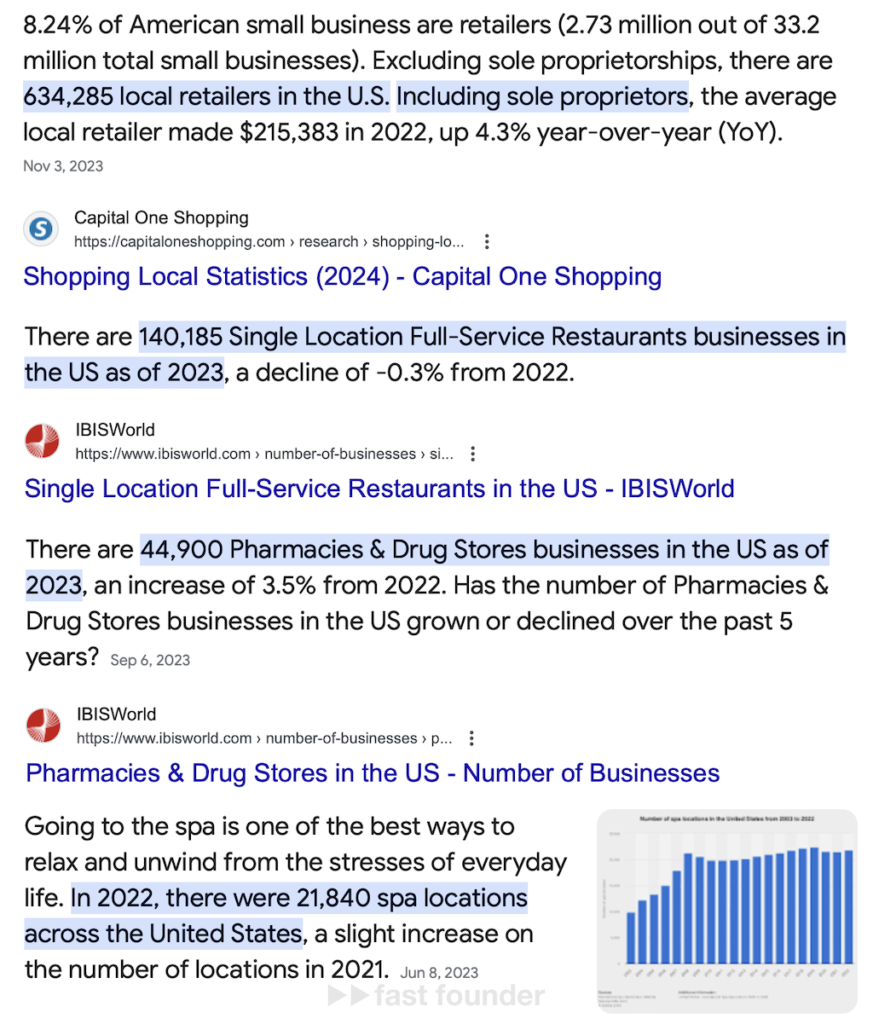- On one hand, there are just a ton of local businesses. And each of them sells something 😉 In the USA, for example, there are about 30 million such businesses!
- On the other hand, there are also a heck of a lot of manufacturers and federal distributors. And they’re all looking for someone to sell their goods through 😉
- All that’s left is to create a place where they can find each other! And a useful platform like this could be the first step towards that:
Project Essence

Openmart helps manufacturers and national distributors find local businesses that may be interested in selling their products.

These local businesses can be stores, beauty salons, dentists, hotels, restaurants, cafes, bars, travel agencies, museums, regional distributors, suppliers, and marketplaces.

The problem is that there are many such local businesses, and they have to be searched for on Google, on Google Maps, in yellow pages, on review websites, and on other regional websites. Even if you find the names and categories of businesses, you’ll still have to figure out what they actually sell and whether you can fit in with your products.
There are services with detailed regional databases, but their services are quite expensive. For example, to use ZoomInfo’s services, you need to pay them at least $50,000 for annual access to their database.

Openmart helps manufacturers and distributors find similar information faster and cheaper with the help of its AI assistant. This allows cutting the time spent on lead generation by half, reducing salespeople’s time spent on contacts with irrelevant leads by 20%, and increasing sales volume by 150% by discovering thousands of new sales opportunities.

The first thing to do on the platform is to enter information about your company, provide examples of your most popular products, and specify the categories of local businesses you are interested in.

After that, you can ask the platform’s AI assistant questions like “show me a list of stores selling environmentally friendly bedding,” if you sell such bedding, or “show me a list of veterinarians discussing treatment of joint diseases in cats,” if you sell medicines or dietary supplements to combat these diseases.

The resulting lists can be further narrowed down using filters, starting from obvious ones like the location of sellers and ending with non-obvious characteristics of customers of these stores like “Generation Z” or “economical people.”

Recently, the startup added the ability to find leads directly from Google search results. The problem is that in search results for seemingly targeted queries like “companies renting out housing,” almost all of the links found will represent links to various informational materials and articles on the topic, rather than links to company websites.

Therefore, they need to be able to extract them, but doing it manually is long and tedious.
Contacts found in this way can be saved in the CRM, which is right there in the platform’s dashboard, and start working with them, marking the current negotiation statuses.

The standard platform tariffs cost $250 and $699 per month. They differ in the number of leads that can be saved in CRM and enriched with additional data.

One of the recently added options for such data enrichment is obtaining the name of the person making decisions in the found business. The startup claims that addressing a specific person by name increases the effectiveness of cold calls by 50%.

Openmart was founded in 2023, and now it is going through acceleration in Y Combinator. The startup announced the launch of its platform a week ago, although it has been working in beta mode for some time.

Despite such an early stage, the startup already has real customers. This helped the startup attract its first investments not only from Y Combinator (a granted $500,000) but also an undisclosed amount from two other funds.
What’s interesting
There are many small local businesses in any country.

In the USA alone, there are 33.3 million small businesses, the majority of which are precisely local offline businesses. This means they either resell other people’s goods directly (like stores) or use others’ products in their work (like cosmetic salons using skincare and other self-care products).

Breaking it down by categories, there are over 600 thousand local stores, over 140 thousand local non-chain restaurants, over 44 thousand pharmacies, and over 21 thousand cosmetic salons in the USA.
Can you imagine how much you can sell to all of them? 😉 On the other hand, cold-calling so many companies blindly can take a very long time. And without understanding what exactly they are already selling, most calls will end up being made in vain—but salespeople will still spend their time and money on it. ☹️
So, Openmart’s solution comes in handy in this case. Essentially, it’s an AI tool like ChatGPT—but one you can talk to about local businesses, and it’s immediately geared towards providing results in the form of tables suitable for further sales work.
In essence, Openmart represents a reincarnation of the old business of “yellow pages”—but at a new, higher quality level, allowing for a smarter way to filter information and obtain more details.
In other words, it’s not something entirely new—but old, yet improved. This gives hope that it will be in demand 😉
Where to Go
It’s possible that the current version of the Openmart platform is just the first step in a more strategic direction, which could become a possible direction for those who decide to delve into the same topic as Openmart.
This direction is the creation of a multifunctional platform solution for connecting manufacturers and federal distributors with small local businesses.
Manufacturers and federal distributors need this because local businesses represent a powerful infrastructure for reselling their products.
Local businesses need this because they are constantly interested in finding more profitable suppliers and/or suppliers of such products that can help them grow and expand their business.
Therefore, it’s important for such a platform not to become a tool for spamming and pushing products but to offer a win-win cooperation mechanism between suppliers and resellers.
And most importantly—it’s possible! Because ultimately, it’s needed by both sides.
What capabilities and features should such a platform have? What mechanisms can be used to protect against spam and abuse within the platform? What could be the revenue model for such a platform?
About the Company
Openmart
Website: openmart.ai
Latest Funding Round: $500K, 01/12/2024
Total Funding: $500K+, Rounds: 2
